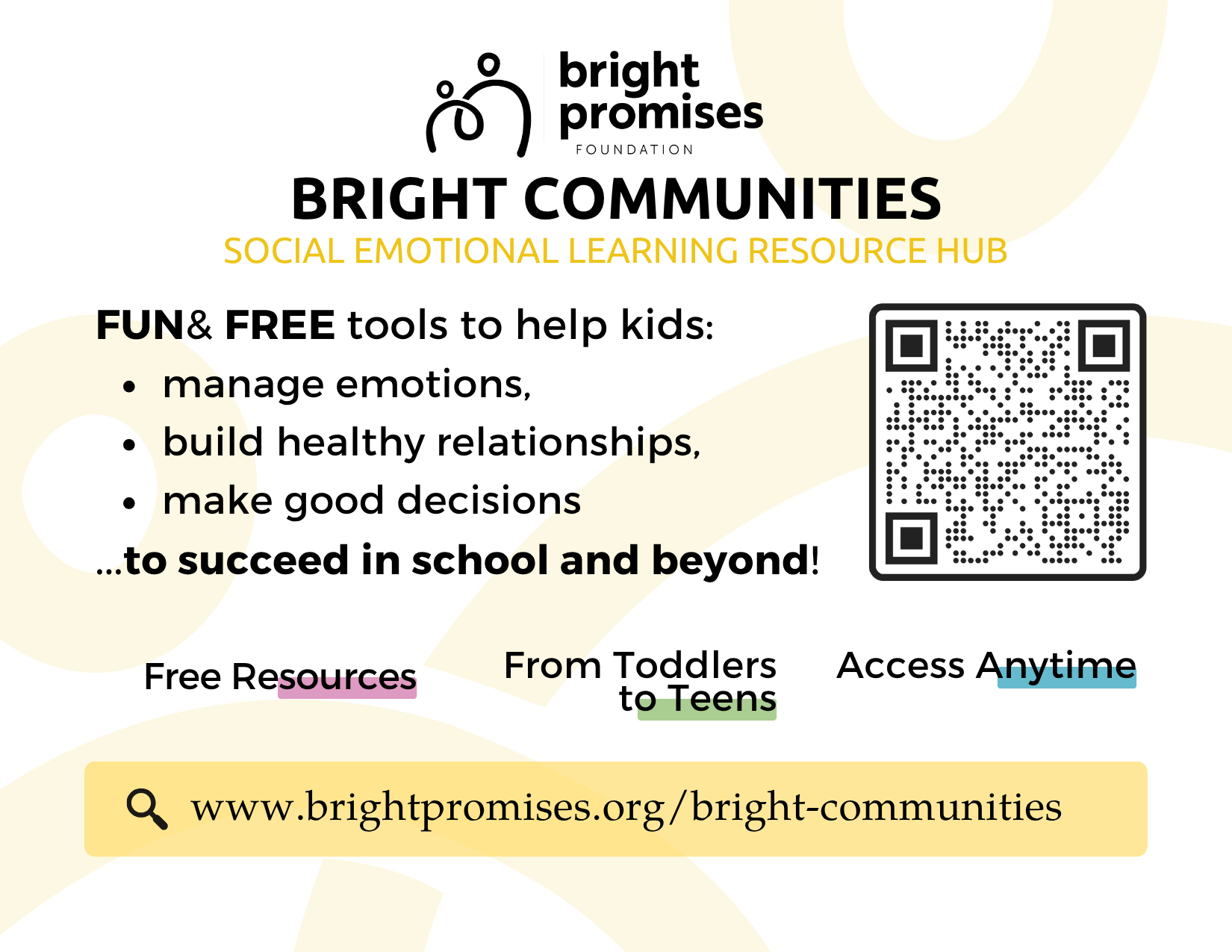Social Emotional Learning and the Safety of Children
Social Emotional Learning and the Safety of Children
by Jim Hirsch, Executive Director, Bright Promises Foundation
It looks like our divisive political reality has devolved into questioning the perceived efficacy of Social Emotional Learning (SEL). I use the word perceived intentionally given that SEL until very recently was considered a sound and prudent practice by many people on all sides of the political spectrum. It is especially telling that these questions have surfaced at a time when children and youth need the skills SEL provides more than ever due to the stress and strain caused by the pandemic. Efforts to prevent these practices is the opposite of helping our kids and could cause further harm.
If you aren’t completely familiar with SEL, it focuses on five core competencies. These are: self-awareness, self-management, social awareness, relationship skills, and responsible decision-making. These competencies enable young people to show empathy to others, identify and manage emotions, resolve conflicts, enter into healthy relationships, achieve goals, be resilient, take responsibility, and recognize and make responsible decisions. SEL is part of a whole-child approach to teaching and learning, not just for students who are facing a crisis.
Sounds good, right? So why has this research-based framework, successfully employed in many applications across the country now coming under scrutiny and criticism? In a word, politics.
In Florida, SEL was cited as one reason that 41% of math textbooks were rejected, and some leaders there have conflated SEL with Critical Race Theory. These and other acts have fostered a political backlash in some quarters to the concept and value of social emotional learning instruction itself, and could put a brake on its growth if school districts or individual teachers become concerned about offending or contradicting those opposed to teaching SEL.
There are also concerns about federal funding that underwrites various learning assistance programs, including social emotional learning, that must be obligated by 2023. Withdrawal of these funds could cripple broader implementation of these critical programs that due to COVID, school shootings, and other factors, make them more critical than ever.
Even helping one young person make better, more compassionate decisions has real value for all of us.
Since 2016, Bright Promises Foundation has invested in SEL through our SEL@Home initiative that has provided support to 14 Chicago and suburban based organizations serving over 10,000 children and youth. I recently attended a training provided by one of our partner organizations, Palenque LSNA, that shared SEL practices with over 400 teachers and caregivers from across the state. I have no doubts that this training will help the attendees provide their students and young people under their care with the tools needed to thrive in these challenging times. Even helping one young person make better, more compassionate decisions has real value for all of us.
Well-intentioned people can disagree about a myriad of issues, and society can benefit from the conversations that grow out of those debates. Given the principles that undergird SEL and the results that these programs have already delivered to children and youth across the country, I am hard pressed to understand how creating politically based divisions benefit any of us. Bright Promises Foundation remains steadfastly supportive of the use of SEL practices, not because of any political agenda, but because they work.
Social Emotional Learning and the Safety of Children
by Jim Hirsch, Executive Director, Bright Promises Foundation
It looks like our divisive political reality has devolved into questioning the perceived efficacy of Social Emotional Learning (SEL). I use the word perceived intentionally given that SEL until very recently was considered a sound and prudent practice by many people on all sides of the political spectrum. It is especially telling that these questions have surfaced at a time when children and youth need the skills SEL provides more than ever due to the stress and strain caused by the pandemic. Efforts to prevent these practices is the opposite of helping our kids and could cause further harm.
If you aren’t completely familiar with SEL, it focuses on five core competencies. These are: self-awareness, self-management, social awareness, relationship skills, and responsible decision-making. These competencies enable young people to show empathy to others, identify and manage emotions, resolve conflicts, enter into healthy relationships, achieve goals, be resilient, take responsibility, and recognize and make responsible decisions. SEL is part of a whole-child approach to teaching and learning, not just for students who are facing a crisis.
Sounds good, right? So why has this research-based framework, successfully employed in many applications across the country now coming under scrutiny and criticism? In a word, politics.
In Florida, SEL was cited as one reason that 41% of math textbooks were rejected, and some leaders there have conflated SEL with Critical Race Theory. These and other acts have fostered a political backlash in some quarters to the concept and value of social emotional learning instruction itself, and could put a brake on its growth if school districts or individual teachers become concerned about offending or contradicting those opposed to teaching SEL.
There are also concerns about federal funding that underwrites various learning assistance programs, including social emotional learning, that must be obligated by 2023. Withdrawal of these funds could cripple broader implementation of these critical programs that due to COVID, school shootings, and other factors, make them more critical than ever.
Even helping one young person make better, more compassionate decisions has real value for all of us.
Since 2016, Bright Promises Foundation has invested in SEL through our SEL@Home initiative that has provided support to 14 Chicago and suburban based organizations serving over 10,000 children and youth. I recently attended a training provided by one of our partner organizations, Palenque LSNA, that shared SEL practices with over 400 teachers and caregivers from across the state. I have no doubts that this training will help the attendees provide their students and young people under their care with the tools needed to thrive in these challenging times. Even helping one young person make better, more compassionate decisions has real value for all of us.
Well-intentioned people can disagree about a myriad of issues, and society can benefit from the conversations that grow out of those debates. Given the principles that undergird SEL and the results that these programs have already delivered to children and youth across the country, I am hard pressed to understand how creating politically based divisions benefit any of us. Bright Promises Foundation remains steadfastly supportive of the use of SEL practices, not because of any political agenda, but because they work.








.svg)

